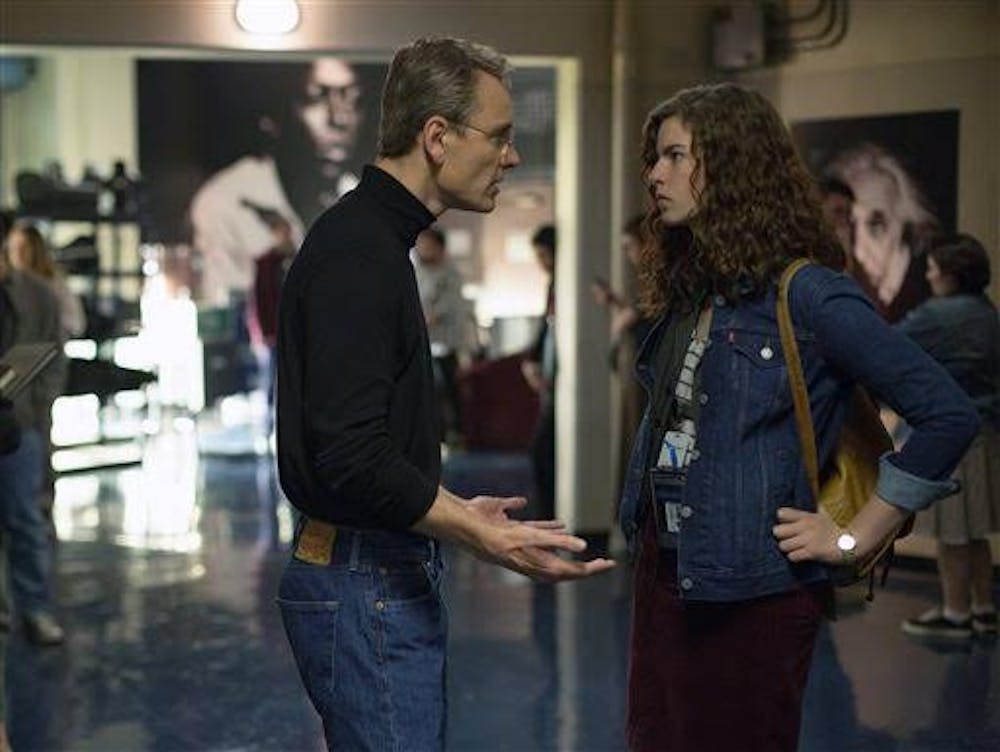By Kayla Lafi
Features Assistant
Director Danny Boyle and award-winning screenwriter Aaron Sorkin have teamed up to bring audiences a behind-the-scenes look into the success story of the former Apple CEO in their new film, “Steve Jobs.”
“Steve Jobs” details three of Jobs’ iconic product launches and his subsequent rise to fame. The film begins with the 1984 Apple Inc. product launch of the first Macintosh computer. After being fired from Apple Inc., Jobs then launches his NeXT educational computer in 1988. It is 10 years later, when this company has failed that Jobs returns to Apple Inc., and launches the first iMac —kickstarting the Apple.
The main driving force of this film is director Boyle, who keeps the movie interesting throughout. While the film focuses on Jobs’ three main product launches, it also reveals Jobs’ innerself through backstage conversation with, coworkers, friends and even family. The script, adapted by Sorkin, allows for sparkling dialogue that is fast-paced and passionate, allowing audience members an exclusive glimpse into the man behind Apple.

“Steve Jobs” not only deals with issues between Jobs and his co-workers, but also the personal issues related to his ex-girlfriend, Chrisann Brennan, and their daughter, Lisa. The biopic drama focuses on the people around Jobs, with personal accounts and information from those involved in his life. A sequence of flashbacks reveals the backstories and personal details of Jobs, including how he was fired from his own company, Apple Inc., and his childhood adoption.
Michael Fassbender gives a magnificent performance as Jobs. He is arrogant, rude and easily enraged. Fassbender’s portrayal of Jobs is that of a confident man who believes he is going to change the world, despite what it may cost him along the way.
The film opens with the 1984 product launch of Macintosh, where Jobs is seen insulting and arguing with his lead developer, Andy Herzfeld (Michael Stuhlbarg) and marketing chief, Joanna Hoffman (Kate Winslet). It is soon revealed that Jobs considers Hoffman to be his so-called “work-wife.” She devotes her time to working closely with Jobs and playing his keeper. She says this is because she is the “only one who can handle (Jobs).” Throughout the film, Hoffman is Jobs’ sense of focus — she brings Jobs out of the sky and closer to the ground.
We know that Jobs was not known as the engineer, coder or even the software developer of the company. He was a visionary and innovator — a man with ideas that would one day change the world. In a memorable scene, Jobs is confronted by his longtime friend and Apple co-founder, Steve Wozniak, who demands he give credit where it is due. Jobs’ remarkably cruel and genius answer to Wozniak is, “The musicians play the instruments. I play the orchestra.”
The statement is both telling and indisputably true. Jobs was the mastermind and showrunner of Apple. Although he may not have been the one to build the first iMac or bring these ideas to life, he is the one who gets all of the credit and will be forever remembered.
During the film, I could not help but both despise and admire Jobs. I felt for his daughter, Lisa, and hoped the two would find reconciliation. I was shocked by his attitude and behavior toward certain co-workers. Nevertheless, Jobs was an undeniable genius who helped create the world we live in today — a world of iPhones, iPads, iPods and Apple TV. The self-titled film helps shed light on the mystery of a man who revolutionized the tech industry.







